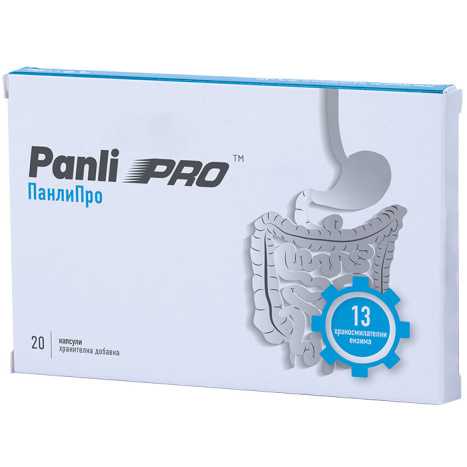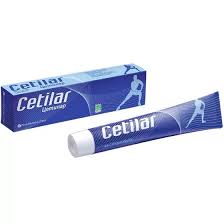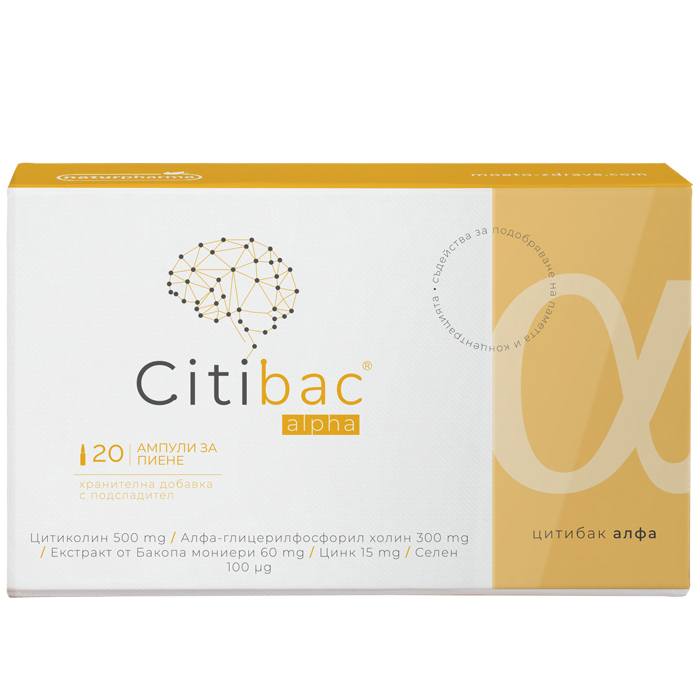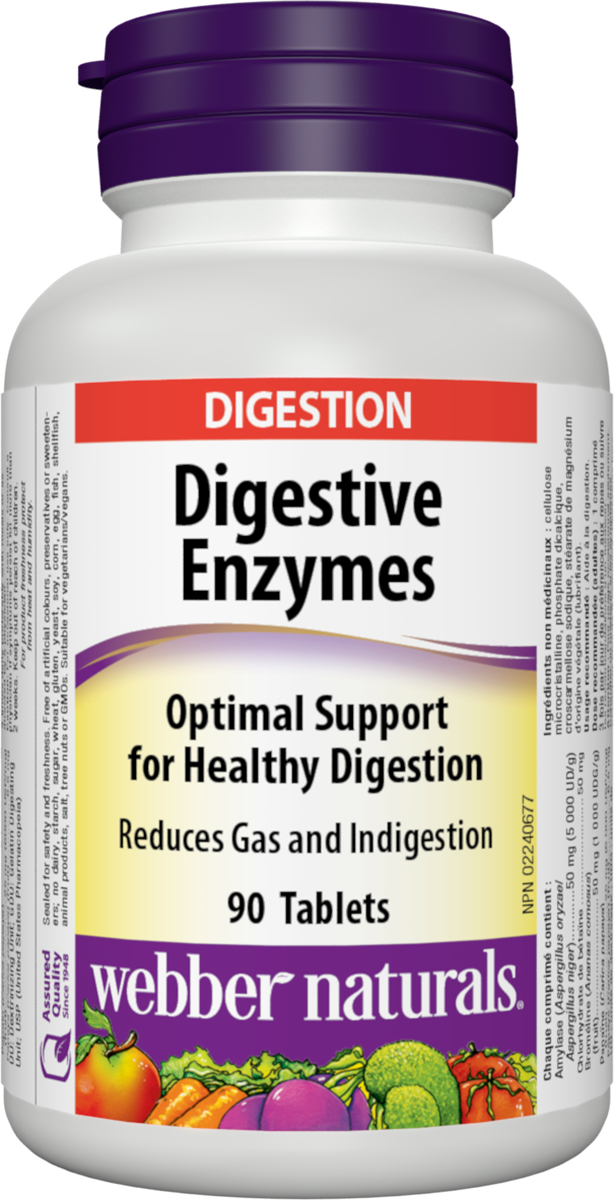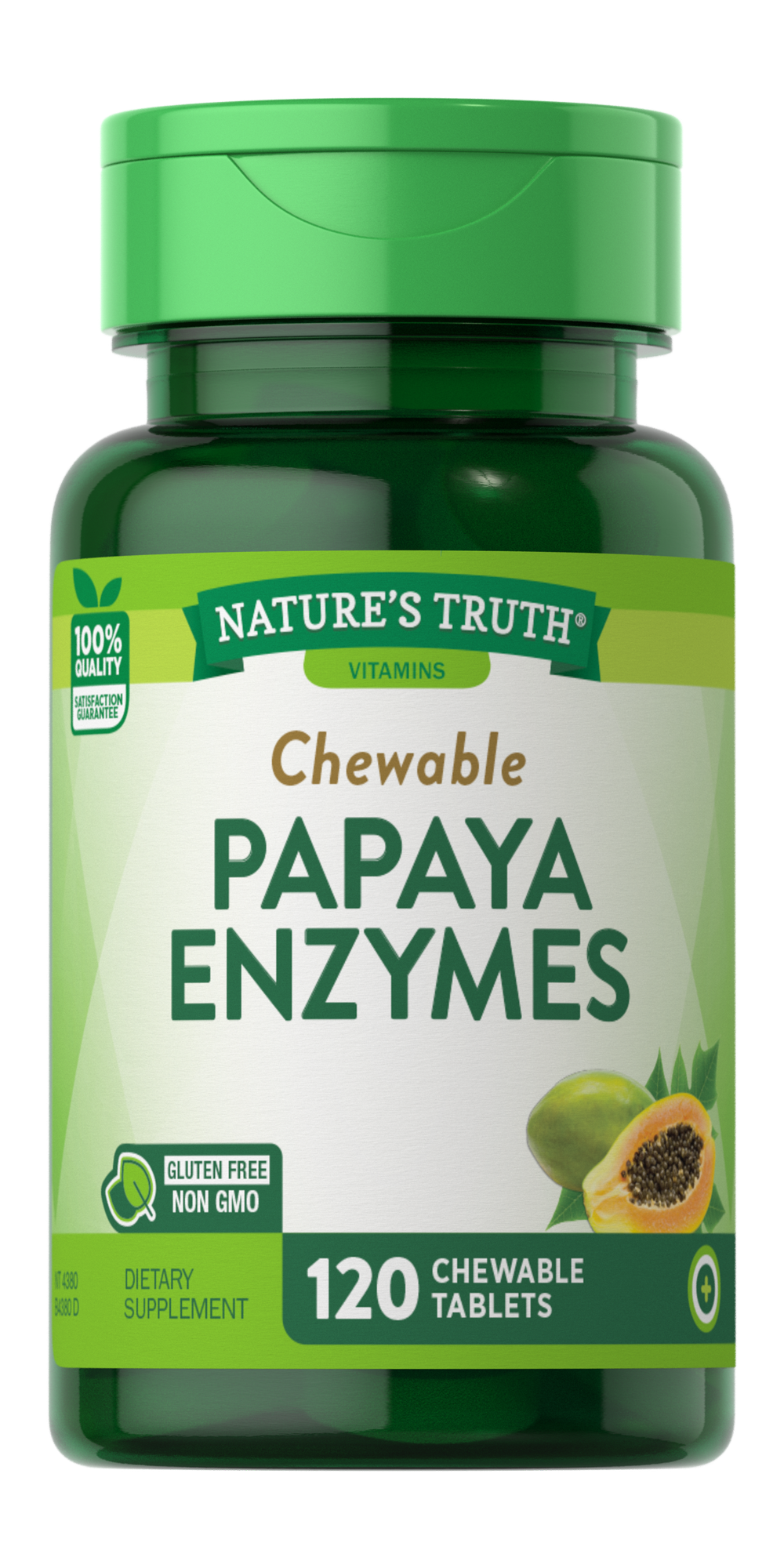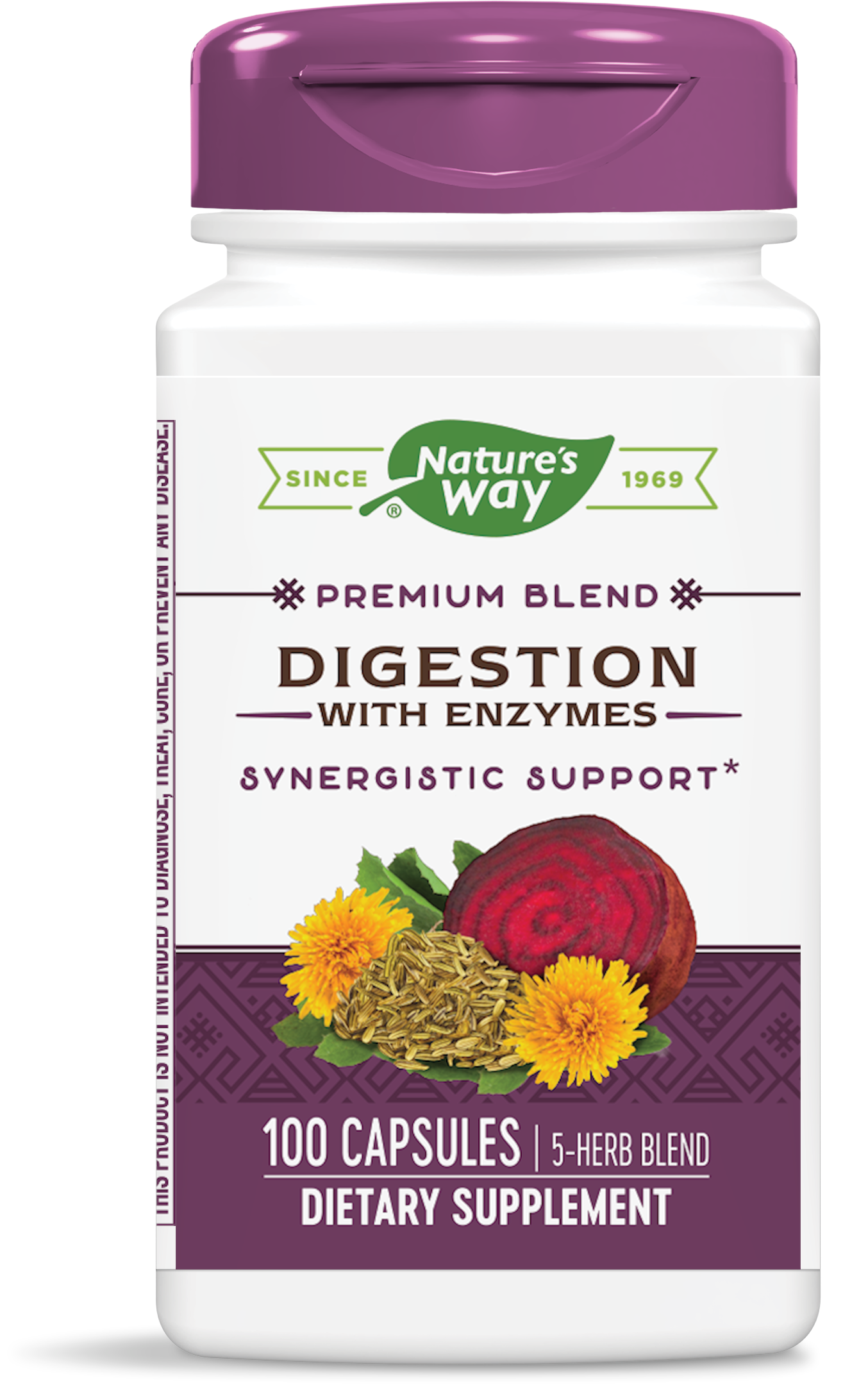NATURPHARMA PANLI PRO digestive enzymes x 20 caps
Enjoy your favorite foods and drinks without bloating, heaviness in the stomach and remorse with Panli PRO: a combined formula of 13 complementary digestive enzymes for better digestion, more complete breakdown of foods and more complete absorption of nutrients, more lightness and comfort in the stomach after meals.
Enzymes are a special type of protein that the body produces to catalyze chemical reactions. Our stomach, pancreas, salivary glands and intestinal epithelium secrete digestive enzymes - with their help, food is broken down into substances that can be directly assimilated by the body. Without them, a significant part of the food would pass through our body intact, undigested and provoking various undesirable effects associated with:
- its fermentation and the subsequent accumulation of gases in the intestines;
- depriving it of its valuable ingredients and creating conditions for malnutrition;
- the adverse effects of inflammatory substances present in it.
Current scientific estimates indicate that up to 45% of the world's population suffers from dyspepsia - indigestion and gastrointestinal discomfort (Mahadeva, S., & Goh, KL, 2006). Risk factors include underlying psychological disorders, smoking, increased caffeine and alcohol intake, and treatment with nonsteroidal anti-inflammatory drugs.
Even universal processes such as aging play a role. It has been shown that older people produce significantly fewer enzymes (Laugier, R., et al., 1991) and this is one of the main factors for their greater risk of nutritional deficiencies (Evans, C., 2005).
Last but not least, stress is also a part of this puzzle - it has been found that chronic stress can lower pancreatic enzyme levels (Takano, S., et al., 1992) and cause indigestion and malabsorption of nutrients (Nikfarjam, M., et al., 2017).
Panli PRO digestive enzymes have a beneficial effect on:
- Gas, heaviness and bloating in the stomach and intestines
- Gastritis, colitis, pancreatitis
- Increased intestinal permeability (leaky gut)
- Adverse skin reactions associated with food intolerance or allergy
- Food intolerances and allergies
- Decreased enzyme secretion associated with advancing age
- Discomfort associated with increased food and protein intake by athletes
- Nutrient malabsorption associated with enzyme deficiency
Ingredients (in 1 capsule):
- Amylase: 50.5 mg (providing 7,500 DU)
- Protease 4.5: 27.8 mg (provides 25,000 HUT)
- Bromelain: 16.8 mg (providing 500,000 PU)
- Papain: 13.2 mg (providing 500,000 PU)
- Glucoamylase: 9.3 mg (provides 10 AGU)
- Alpha-galactosidase: 5.9 mg (providing 150 GaIU)
- Lactase: 5.3 mg (provides 500 ALU)
- Protease 3.0: 5.1 mg (provides 25 SAPU)
- Lipase: 3.7 mg (provides 1,000 FIP)
- Phytase: 3.5 mg (provides 10 FTU)
- Cellulase: 3.1 mg (provides 500 CU)
- Hemicellulase: 1.4 mg (providing 1,000 HCU)
- Pectinase: 1.2 mg (provides 10 endo PGU)
Excipients: medium chain triglycerides, microcrystalline cellulose (emulsifier), magnesium stearate (anti-caking agent), rice dextrin.
Recommended dosage:
Take 1 capsule of Panli PRO during main meals. For larger meals, take 2 capsules.
Packaging: 20 capsules
Contraindications: Do not use during pregnancy, breastfeeding and children under 6 years of age. Do not use in case of hypersensitivity to any of the ingredients. It is possible to cause an allergic reaction in case of hypersensitivity to any of the ingredients (especially in case of hypersensitivity to pineapple and papaya).
Warnings: Do not exceed the recommended daily dose! Do not use the food supplement as a substitute for a varied diet! Keep out of the reach of small children!
Storage conditions: Store in a dry place at room temperature.
Learn more about digestive enzymes:
Amylase is one of the main enzymes responsible for the digestion of starch. It is so important that it is produced in two places in the body - in the mouth (as part of saliva) and in the pancreas (as part of pancreatic juice).
Glucoamylase is similar to amylase in that it also breaks down the starch in the foods we eat. The difference is that it does not "break" the starch chain into smaller chains, but "cuts" single glucose molecules from its end.
A protease (also known as a proteolytic enzyme, peptidase, or proteinase) is an enzyme that specializes in breaking down proteins. Proteases come in many different types and are involved in a number of important biological functions – digestion, the breakdown and recycling of old proteins in the body, cell signaling, and more.
Bromelain is a special type of proteolytic (protein-breaking) enzyme complex native to pineapple. It is found in the fruit and is particularly concentrated in the stem of the plant. It can break down a wide range of proteins over a wide range of pH levels – both in acidic (stomach) and alkaline (intestine) conditions.
Papain is a powerful digestive enzyme found naturally in the fruit, stem, and leaves of the papaya (Carica papaya). Also called papaya proteinase, it can break down not only proteins but also starches and fats. For this reason, in Latin America, papaya is a preferred digestive and a key ingredient in meat tenderizing marinades.
Alpha-galactosidase is particularly effective in breaking down a class of carbohydrates (galacto-oligosaccharides or GOS) found in legumes, some grains, cabbage, broccoli and some other vegetables. It is these carbohydrates that are responsible for the adverse effects of consuming legumes and cruciferous vegetables – gas, bloating and disturbing effects.
Lactase helps break down milk sugar, also known as lactose. Because lactose is found primarily in milk, lactase production in mammals declines with age. Humans are no exception to this rule, and as a result, many of us suffer from what is known as hypolactasia, a condition known as lactose intolerance or malabsorption. It is estimated that 65%–75% of the world’s population suffers from lactose intolerance, which manifests itself in a number of unpleasant symptoms, such as abdominal pain, severe intestinal rumbling, nausea, bloating, gas, and diarrhea.
Lipase is a digestive enzyme that is responsible for breaking down fats and “unlocking” the important fat-soluble substances they contain, such as vitamins A, D, E, and K. Taking lipase before a high-fat meal significantly reduces the symptoms of indigestion – a feeling of overeating, gas, bloating, and nausea (Levine, ME, et al., 2015).
Phytase breaks down phytic acid, which makes many minerals in plant foods unavailable for absorption by the body. Humans do not produce enough phytase to break down large amounts of phytic acid. Therefore, it is recommended that a diet high in grains, legumes, seeds, and nuts be supplemented with the enzyme as insurance against nutrient deficiencies (Iqbal, TH, et al., 1994; Nielsen, AV, et al., 2013; Lei, XG, & Porres, JM, 2011).
Cellulase is responsible for the breakdown of cellulose, a complex carbohydrate found in all green plants and the husks of cereals. Our digestive tracts are much shorter than those of herbivores, making us much less suited to handling large volumes of plant food, which, while beneficial to health, is often accompanied by adverse symptoms such as bloating and gas.
Hemicellulase is the enzyme specialized in breaking down hemicellulosic carbohydrates, which can cause diarrhea, belching, and bloating, as well as elevated triglyceride levels (Onakpoya, I., et al., 2014).
“ Pectinase ” is the collective name for a group of enzymes responsible for the breakdown of pectin. They may improve the absorption of nutrients from pectin-rich foods and reduce the risk of constipation associated with high pectin intake (Sandri, IG, & Silveira, MMD, 2018).
Manufacturer: Plantapol – Spain, C/G 18, Pol.Malpica – Alfinden, La Puebla Del Alfinden Zaragoza, Spain
Distributor: "Naturpharma Bulgaria" EOOD, Sofia, 21 Yanko Sofiyski Str., tel. 02/ 963 33 59, info@naturpharmabg.com


